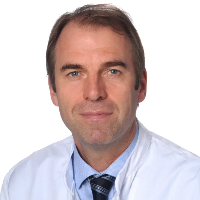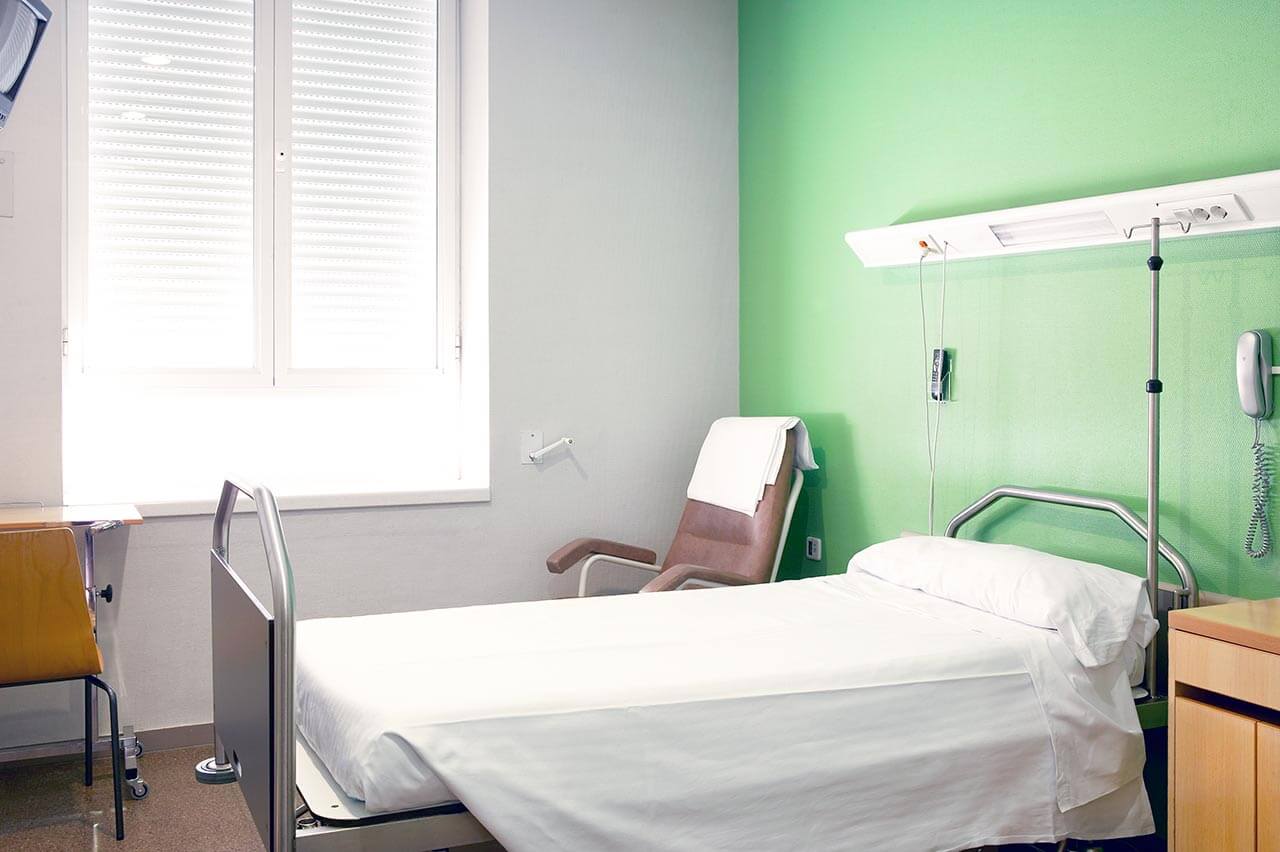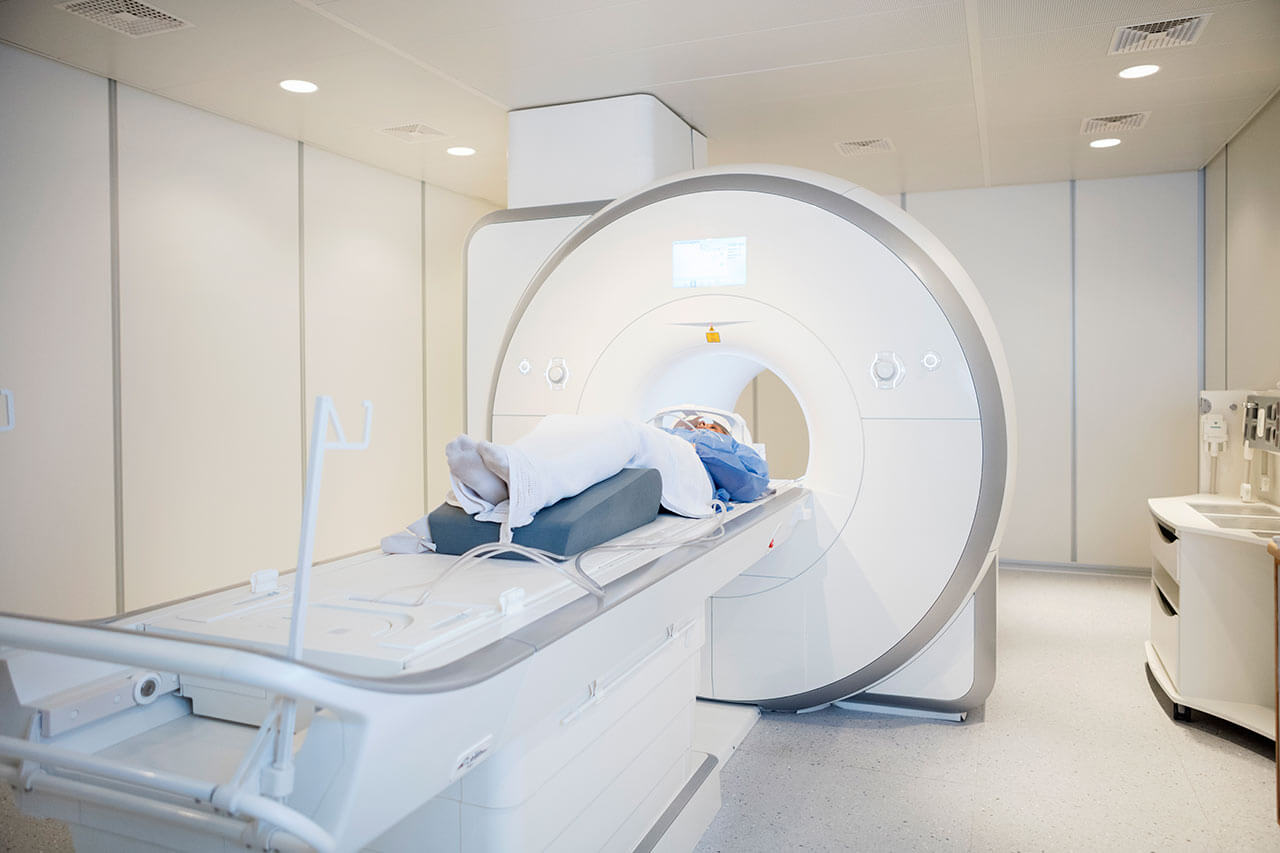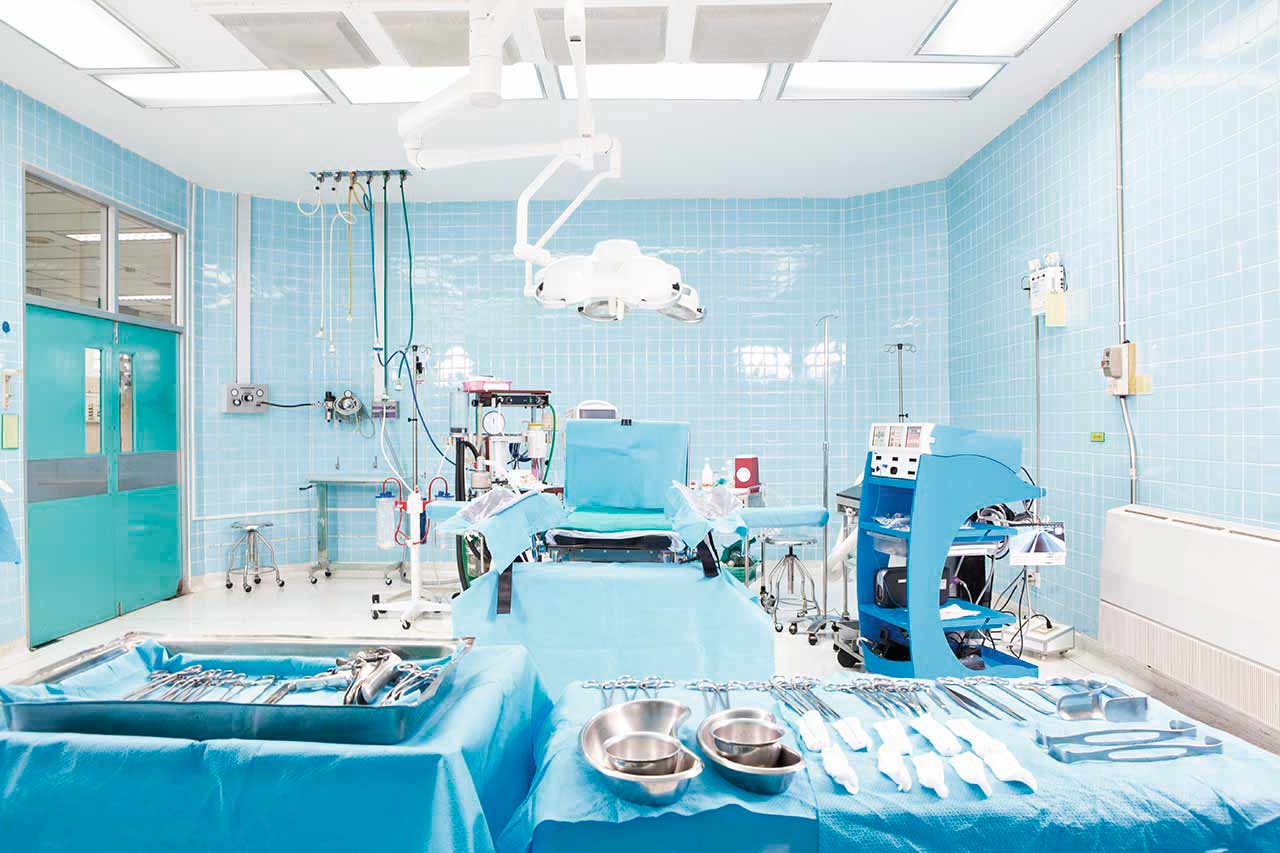
The program includes:
- Initial presentation in the clinic
- clinical history taking
- review of medical records
- physical examination
- laboratory tests:
- complete blood count
- general urine analysis
- biochemical analysis of blood
- TSH-basal, fT3, fT4
- tumor markers (AFP, CEA, СА-19-9)
- inflammation indicators (CRP, ESR)
- indicators blood coagulation
- abdominal ultrasound
- CT/MRI abdomen
- preoperative care
- olostomy closure
- symptomatic treatment
- control examinations
- the cost of essential medicines and materials
- nursing services
- nutrition recommendations
- full hospital accommodation
- explanation of future recommendations
Required documents
- Medical records
- MRI/CT scan (not older than 3 months)
- Biopsy results (if available)
Service
You may also book:
 BookingHealth Price from:
BookingHealth Price from:
About the department
The Department of General, Abdominal, Transplant, Hepatopancreatobiliary, Colorectal, Endocrine, Bariatric Surgery and Hernia Surgery at the University Hospital of Ludwig Maximilian University of Munich provides the full range of services in the areas of its specialization and holds a leading position at the national and international levels in terms of the number of surgical interventions performed and their success. Of particular interest are operations for treating diseases of the bowel, stomach, esophagus, pancreas, liver, gallbladder, and bile ducts, and endocrine glands. The department's doctors have excellent skills in the surgical treatment of cancer, surgery for liver, kidney, pancreas, and small intestine transplants, and operations for morbid obesity. The department's operating rooms are the pride of the medical facility, since they have all the necessary technical options for performing operations with the da Vinci surgical system, image-guided interventions, and endoscopic surgical procedures, which are characterized by minimal trauma rates. The department is headed by Prof. Dr. med. Jens Werner.
One of the most important focuses of the department's work is surgery for stomach and esophageal diseases such as polyps, gastroesophageal reflux disease, esophageal diverticulum, stomach and esophageal cancers, gastroesophageal junction adenocarcinomas, gastrointestinal stromal tumors, neuroendocrine tumors, and sarcomas. In most cases, the department's surgeons manage to perform the intervention using minimally invasive techniques without extensive skin and soft tissue incisions. When dealing with cancer treatment, doctors complement a surgical intervention with conservative treatment such as chemotherapy, radiation therapy, targeted therapy, etc. It is worth noting that doctors also offer patients an innovative type of treatment, which is surgery followed by hyperthermic intraperitoneal chemotherapy (HIPEC). The technique is indicated for patients with cancer spread in the abdominal cavity and metastases in the peritoneum.
The department's surgical team often admits patients with various colon diseases. The most common of these include colon polyps, colon cancer, diverticular disease, chronic inflammatory bowel disease (Crohn's disease and ulcerative colitis), and rectal pathology. Almost all interventions for the above-mentioned diseases are performed laparoscopically. In cases with appropriate clinical indications, robot-assisted surgical techniques can also be used. The department has the status of a Center of Excellence for Colorectal Surgery certified by the German Society for General and Visceral Surgery (DGAV) and the German Cancer Society (DKG). Patients can be confident that they are entrusting their health to highly qualified professionals who will provide the best possible outcome.
In the field of hepatopancreatobiliary surgery, the department performs highly effective operations for liver, gallbladder, and bile duct diseases. Particular attention is paid to the medical care for patients with liver, gallbladder, and bile duct cancers, liver metastases, liver adenomas, gallstones (cholecystolithiasis) and gallbladder inflammation (cholecystitis), and bile duct stenosis. In most cases, the department's surgeons successfully perform low-traumatic laparoscopic interventions. However, they also have vast experience in complex and extensive resections, which are often combined with organ transplants, such as liver or pancreas transplants.
The department offers modern surgical options for endocrine disorders: pathologies of the thyroid gland, parathyroid glands, and adrenal glands. The department's endocrine surgeons perform resections of benign and malignant neoplasms. The resection or removal of the endocrine organ affected by the pathological process can be performed whenever required. The department's endocrine surgeons practically do not perform open surgery and prefer sparing laparoscopic techniques that require only a few small skin incisions. Thanks to the use of minimally invasive techniques, the period of a hospital stay is significantly reduced, the pain syndrome is mild, and the risk of postoperative complications is negligible. The department's specialists closely cooperate with doctors from the Departments of Endocrinology, Nuclear Medicine and Radiology. Colleagues regularly meet at interdisciplinary boards to consider clinical cases and develop an optimal treatment regimen. It is worth noting that for more than 20 years the department has been one of the leading medical facilities in Germany specializing in the surgical treatment of adrenal tumors.
The department's surgical options are complemented by morbid obesity treatment. Today, excess weight is becoming an increasingly urgent problem, usually arising from an unbalanced diet and a sedentary lifestyle. Obesity is not only an aesthetic problem, as this condition can also cause severe pathological changes. For example, obese patients have a high risk of developing diabetes mellitus, atherosclerosis, gastroesophageal reflux disease, obstructive sleep apnea syndrome, oncology, etc. The initial measure to combat excess weight is lifestyle modification: diet and intense physical activity. However, these methods often do not give the desired result for morbid obesity, and in this case, bariatric surgeons come to the rescue. The department's team of doctors offers patients modern and highly effective surgical interventions for weight loss such as gastric banding, sleeve gastrectomy, and biliopancreatic shunting. The department's patients receive comprehensive treatment, which includes surgery, the elaboration of an individual diet, the selection of the optimal workouts, and psychological care. The department's surgeons perform all bariatric interventions using minimally invasive techniques, which is a great advantage for patients.
The department's main clinical activities are as follows:
- General and abdominal surgery
- Appendix removal surgery (appendectomy)
- Spleen removal surgery (splenectomy)
- Surgery for gastroesophageal reflux disease
- Surgery for esophageal diverticulum
- Surgery for esophageal dysfunction
- Surgery for acute and chronic pancreatitis
- Surgery for peritoneal carcinomatosis
- Surgery for esophageal and stomach malignancy resection
- Surgery for gastrointestinal stromal tumor resection
- Surgery for neuroendocrine tumor resection
- Surgery for malignant pancreatic tumor resection
- Surgery for retroperitoneal space malignancy resection
- Surgery for metastasis and recurrent solid tumor resection
- Hernia repair surgery
- Inguinal hernias
- Shouldice technique
- Liechtenstein operation
- Rutkov technique
- Incisional hernias
- Laparoscopic surgery with Gore Tex Netz intraperitoneal mesh
- Femoral hernias
- Laparoscopic TAPP hernioplasty (transabdominal preperitoneal repair)
- Umbilical hernias
- Hernia resection with mesh overlay (for large hernias)
- Inguinal hernias
- Transplant surgery
- Kidney transplant
- Liver transplant
- Pancreas transplant
- Small intestine transplant
- Hepatopancreatobiliary surgery
- Surgery for liver cancer: liver resection and total removal followed by transplant surgery
- Surgery for liver metastases
- Surgery for cholangiocellular carcinoma
- Surgery for Klatskin tumor (trisectionectomy)
- Surgery for gallbladder cancer (tumor removal and resection of the bile ducts and part of the liver at the advanced stages)
- Surgery for benign liver tumors
- Surgery for echinococcosis
- Surgery for non-calculous and calculous cholecystitis (laparoscopic gallbladder removal)
- Colorectal surgery
- Surgery for colon cancer
- Surgery for chronic inflammatory bowel disease: Crohn's disease and ulcerative colitis
- Surgery for diverticulitis
- Surgery for fecal incontinence
- Surgery for hemorrhoids and anal fistulas
- Surgery for short bowel syndrome
- Endocrine surgery
- Surgery for thyroid diseases (most often benign and malignant tumors)
- Surgery for parathyroid pathologies (most often benign and malignant tumors)
- Surgery for adrenal diseases (most often benign and malignant tumors)
- Bariatric surgery
- Gastric banding
- Sleeve gastrectomy
- Biliopancreatic shunting
- Other surgical options
Curriculum vitae
Higher Education
- 1986 - 1993 Human Medicine studies in Heidelberg, Birmingham (UK), Baltimore (USA).
- August 1988 Physics studies.
- August 1989 First State Medical Examination.
- July 1990 Foreign Medical Graduates Examination in Medical Sciences (FMGEMS), Part 1.
- January 1992 Foreign Medical Graduates Examination in Medical Sciences (FMGEMS), Part 2.
- March 1992 Second State Medical Examination.
- May 1993 Third State Medical Examination.
- 2005 - 2007 Study of Business Administration in Healthcare Management, University of Trier.
- 18.06.2007 Master of Business Administration (MBA), Healthcare Management.
Professional Career
- 01.06.1993 - 30.11.1994 Internship, Department of Surgery, University Hospital Heidelberg.
- 01.12.1994 Admission to medical practice.
- 01.12.1994 - 30.06.1995 Assistant Physician, Department of Surgery, University Hospital Heidelberg.
- 14.03.1995 Certificate of Сompetency "Emergency Service Doctor".
- 01.07.1997 - 01.02.2002 Research Fellow, Assistant Physician, Department of Surgery, University Hospital Heidelberg.
- 18.10.2000 Board certification in Surgery.
- 10.01.2001 Additional qualification in Emergency Medicine.
- 01.02.2002 - 31.12.2013 Senior Physician, Department of Surgery, University Hospital Heidelberg.
- 19.10.2004 Additional qualification in Healthcare Quality Management.
- 09.11.2004 Specialization in Abdominal Surgery.
- 01.07.2005 First Senior Physician, Department of Surgery, University Hospital Heidelberg.
- 01.07.2007 - 31.12.2013 Head of the Section of Pancreatic Surgery, Department of Surgery, University Hospital Heidelberg.
- 01.01.2010 - 31.12.2013 Managing Senior Physician, Department of Surgery, University Hospital Heidelberg.
- 01.07.2011 - 31.12.2013 Deputy Head of the Department of Transplant Surgery, Department of Surgery.
- Since 01.01.2014, Head of the Department of General, Abdominal, Transplant, Hepatopancreatobiliary, Colorectal, Endocrine, Bariatric Surgery and Hernia Surgery at the University Hospital of Ludwig Maximilian University of Munich.
Scientific Activities
- 1988 - 1991 Experimental part of the doctoral thesis in the Department of Orthopedics at the University Hospital Heidelberg.
- 28.10.93 Thesis defense at the Faculty of Medicine of the Heidelberg University.
- 1993 - 2013 Scientific Activities in the Department of Surgery, University Hospital Heidelberg, Working Group "Microcirculation, inflammation and pancreas".
- 1995 - 1997 Research Scholarship at the Massachusetts General Hospital, Harvard Medical School in Boston, USA, Scholarship from the German Research Foundation (DFG).
- June 2002 Habilitation in Surgery, Faculty of Medicine, Heidelberg University. Subject: "Pathophysiology and alcoholic pancreatitis therapy".
- 28.10.02 Venia Legendi in Surgery, Faculty of Medicine, Heidelberg University.
- 2004 - 2013 Head of the Working Group "Inflammation and Pancreas".
- 2004 - 2008 Head of the Working Group "Upper Gastrointestinal System".
- 03.21.06 Extraordinary Professor, Heidelberg University.
- 2007 - 2013 Head of the Scientific Working Group "Pancreas".
- February 2010 Course for Surgeons, Heidelberg, KKS.
Memberships in Professional Societies
- German Society of Surgery (DGC).
- Professional Association of German Surgeons (BDC).
- German Society for General and Visceral Surgery (DGAV).
- Working Group on Liver, Gallbladder and Pancreas Surgery of the German Society for General and Abdominal Surgery (DGAV).
- Working Group on Oncology of the German Society for General and Abdominal Surgery (DGAV).
- Working Group on Minimally Invasive Surgery of the German Society for General and Abdominal Surgery (DGAV).
- German Transplant Society (DTG).
- German Society for Gastroenterology, Digestive and Metabolic Diseases (DGVS).
- German Pancreas Club (DPC).
- American Pancreatic Association (APA).
- Society for the Surgery of the Alimentary Tract (SSAT).
- European Pancreatic Club (EPC).
- International Association of Pancreatology (IAP).
- International Hepato-Pancreato-Biliary Association (IHPBA).
- European Hepato-Pancreato-Biliary Association (EHPBA).
Photo of the doctor: (c) LMU Klinikum
About hospital
According to the Focus magazine, the University Hospital of Ludwig Maximilian University of Munich is regularly ranked among the best medical institutions in Germany!
The hospital is the largest multidisciplinary medical facility, as well as a leading research and training center in Germany and Europe. The hospital is proud of its bicentenary history and tirelessly confirms its primacy at the national and international levels. The outstanding quality of medical care is complemented by highly productive research activities, thanks to which many effective diagnostic and therapeutic methods, saving people’s lives, have been presented in medical practice.
The medical facility includes two main buildings, Grosshadern and Innenstadt. The hospital has 29 specialized departments, 53 interdisciplinary centers, 11 institutes, and many sections. More than 500,000 patients are treated here every year, which indicates the hospital's excellent reputation. A large and highly professional medical team, consisting of 1,800 doctors and 3,300 nursing staff, works for the benefit of patients. The hospital has 2,000 beds to accommodate patients.
The hospital's infrastructure deserves special attention: advanced diagnostic equipment that allows doctors to detect the slightest pathological changes in the human body, the latest operating rooms with highly efficient monitoring systems, robot-assisted surgical systems that facilitate sparing operations, and proper postoperative care.
Excellent technical resources and highly professional medical staff are undoubtedly the hospital's pride, but the medical facility also pays attention to the patient's comfort and to a humane attitude toward their life situation. When providing the necessary medical care, doctors and nursing staff always show a friendly attitude, inform patients in detail about the upcoming diagnostic and therapeutic procedures, gladly answer all questions of interest to patients, and provide moral support during the therapeutic process.
The hospital has many prestigious quality certificates, including a DIN EN ISO 9001 certificate, an IQM certificate, an endoCert certificate, certificates from the German Cancer Society (DKG) for treating various types of cancer, the German Cardiac Society (DGK), the German Society for Orthopedics and Trauma Surgery (DGOU), etc. Thus, patients can count on the best possible treatment outcome due to the use of the most effective and, at the same time, sparing therapeutic techniques.
Photo: (с) depositphotos
Accommodation in hospital
Patients rooms
The patients of the University Hospital of Ludwig Maximilian University of Munich live in comfortable, spacious, single and double patient rooms with a modern design. Each room is equipped with an ensuite bathroom with a shower and toilet. The furnishing of a standard patient room includes a comfortable bed, the position of which can be adjusted using the remote control, a locker for storing personal belongings, a TV, and a telephone. Also, if desired, you can connect to the Internet. In addition, patients can opt for enhanced-comfort rooms, with a safe, a fridge, and upholstered furniture.
The hospital has an excellent infrastructure. The medical facility’s area houses a bank, ATMs, a hairdresser, shops with a wide range of food, drinks, newspapers, magazines, and personal hygiene items, play areas for children, and a beautiful garden for walking, etc.
Meals and Menus
The patient and his accompanying person are offered a daily choice of three menus, including a vegetarian one. If you are on a specific diet for any reason, you will be offered an individual menu. Please inform the medical staff about your dietary preferences prior to the treatment.
Further details
Standard rooms include:
Religion
Religious services are available upon request.
Accompanying person
Your accompanying person may stay with you in your room or at a hotel of your choice during the fixed program.
Hotel
You may stay at a hotel of your choice during an outpatient program. Our managers will help you to choose the best option.
The hospital offers a full range of laboratory tests (general, hormonal, tests for infections, antibodies, tumor markers, etc.), genetic tests, various modifications of ultrasound scans, CT scans, MRI and PET/CT, angiography, myelography, biopsies, and other examinations. Treatment with medications, endoscopic and robotic operations, and stereotaxic interventions are carried out here, modern types of radiation therapy are also used. The hospital offers patients all the necessary therapeutic techniques.
- Allogeneic bone marrow transplantation
- Microsurgical transplantation of head and neck tissues
- Microsurgical resection of brain tumors with intraoperative fluorescence
- Minimally invasive treatment of spine pathologies
- Joint replacement with postoperative rehabilitation (fast track program)
Patients with benign and malignant neoplasms of various localizations, pathologies of arteries and veins, herniated discs, osteoporosis, congenital and acquired pathologies of the musculoskeletal system, benign and malignant pathologies of the mammary gland, and other pathologies.
Which specialties of the University Hospital of Ludwig Maximilian University of Munich are the best?
- Interventional and diagnostic neuroradiology
- Vascular surgery
- Cardiac surgery
- Mammalogy
- Gastroenterology and hepatology
Over 1,700 highly qualified doctors work at the hospital.





